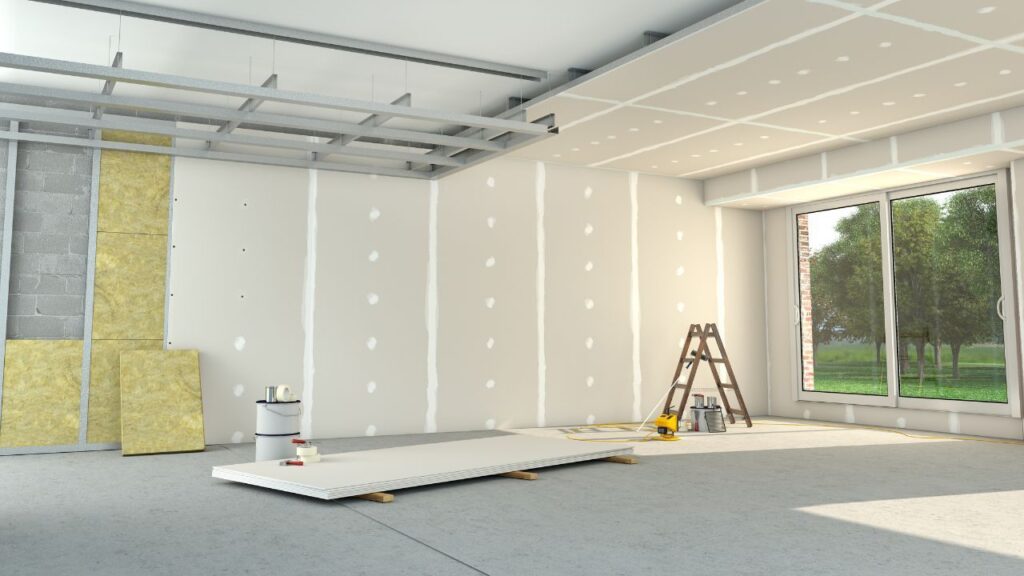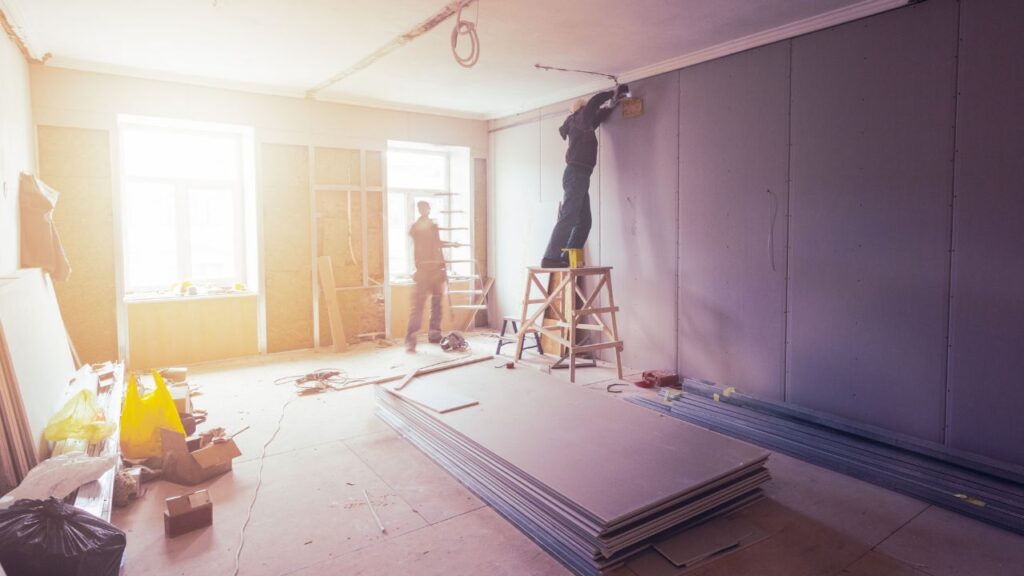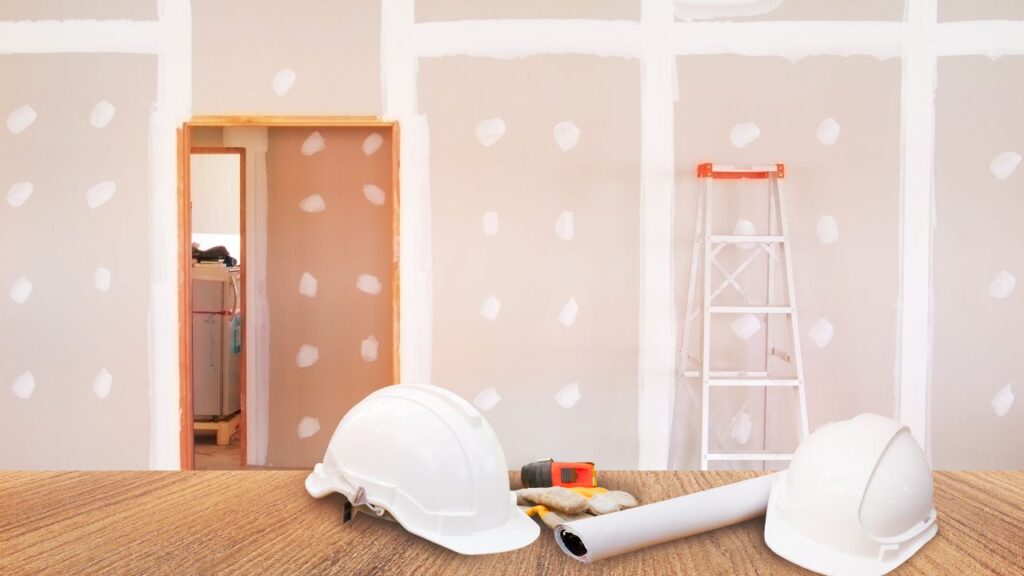Boost Your Drywall Bids – Request a Precision Estimate!
- Accurancy
- Efficiency
- Transparency
- Customization
- Time Saving
- Professionalism
- Cost Control

Drywall is a fundamental element in the construction and finishing of townhouses, providing the basis for interior walls and ceilings. Whether you’re undertaking new construction, renovations, or repairs, having a clear understanding of potential drywall costs is crucial for effective planning. In this comprehensive guide, we’ll explore the factors influencing townhouse drywall costs and provide a detailed estimator to help you budget efficiently.
For construction or renovation projects involving home building, the nationwide average expense for drywall installation stands at $1,800. The average cost per square foot of wall surface ranges from $1.80 to $4.80, approximately translating to $18 to $72 per panel.
These estimates cover both labor and materials. Project expenditures may vary between $600 and $6,720, contingent on variables such as the drywall type, thickness, and finishing preferences.

The dimensions and intricacy of the space earmarked for drywall installation wield a direct influence on project costs. Larger areas inherently demand more materials and labor, contributing to elevated overall expenses. Moreover, the complexity of the space, which includes architectural features, corners, and cutouts, can substantially impact labor costs. Spaces with intricate designs or numerous architectural details may require additional effort, skill, and time, thereby affecting the final cost of drywall installation.
The selection of drywall material is a pivotal factor contributing to the overall cost of the project. Standard drywall, being the most prevalent and cost-effective option, contrasts with specialty drywall types such as moisture-resistant or fire-resistant, which may come at a higher price. The specific requirements of each room should be carefully considered when choosing the type of drywall. Factors like the room’s purpose, exposure to moisture, or the need for enhanced fire resistance can influence material choices and consequently impact the budget for townhouse drywall installation.
The thickness of drywall sheets is a variable that can have implications for costs. While thicker drywall sheets may entail a higher upfront cost, they can offer advantages such as improved sound insulation and enhanced durability. On the other hand, thinner sheets are generally more budget-friendly and may be suitable for specific applications where additional thickness is unnecessary. Striking a balance between the desired performance characteristics and the budget is crucial when determining the optimal thickness of drywall for a townhouse project.
The inclusion of ceiling areas in the drywall installation process can introduce an additional layer of cost consideration. Ceilings often involve extra labor and specialized equipment, especially in spaces with intricate ceiling designs or varying heights. The complexity of ceiling installations can contribute to increased expenses, making it imperative to carefully assess the intricacies of your townhouse’s ceilings when estimating overall drywall installation costs.
The desired finishing and texture for the walls are significant factors influencing the overall cost of drywall installation. Opting for smooth finishes is generally more cost-effective, while textured finishes or decorative treatments may escalate expenses. The finishing process encompasses tasks like taping, mudding, sanding, and the application of primer and paint, each contributing to the overall labor and material costs. Homeowners should weigh the aesthetic preferences against budget considerations when deciding on the level of finishing and texture for their townhouse drywall.
The accessibility of the drywall areas within the townhouse directly influences labor costs. Rooms that are easily reachable may result in more straightforward installations, translating to lower labor expenses. Conversely, spaces that are hard to reach or present intricate layouts may demand additional time and effort from the installation team. Assessing the accessibility of the project site is vital for setting realistic budget expectations and ensuring that all aspects of the drywall installation are appropriately addressed.

The prevailing labor rates in the local market are a crucial consideration when estimating the overall cost of townhouse drywall installation. Labor costs can vary significantly based on the region and local living expenses. Higher labor rates in certain areas may contribute to an increase in overall project expenses. Homeowners should research and take into account the local labor rates to ensure an accurate estimation of the budget required for the drywall installation project in their specific location.

In conclusion, estimating costs for townhouse drywall installation involves a careful consideration of factors such as the size and complexity of the space, the type and thickness of drywall, ceiling installation, finishing preferences, accessibility, and local labor rates. Balancing these elements ensures an accurate budget estimation for achieving a high-quality and visually appealing drywall installation in your townhouse. Homeowners are encouraged to research local market conditions and make informed decisions to ensure a successful project within their specified budget.
The average cost per square foot for drywall installation in a townhouse typically ranges from $1.80 to $4.80. However, these costs can vary based on factors such as the type of drywall material, thickness, and finishing preferences.
The choice of drywall material significantly influences costs. Standard drywall is a cost-effective option, while specialty types like moisture-resistant or fire-resistant drywall may come at a higher price. Consider the specific needs of each room when selecting the type of drywall.
The thickness of drywall sheets can impact costs, with thicker sheets offering advantages like improved sound insulation and durability. However, thinner sheets are generally more budget-friendly. Balancing the desired performance characteristics with the budget is crucial when determining the optimal thickness for a townhouse project.
Larger spaces and those with architectural features, corners, and cutouts may demand more labor, contributing to elevated overall expenses. Intricate designs or numerous architectural details may require additional effort, skill, and time, influencing the final cost of drywall installation.
Ceiling installations often involve extra labor and specialized equipment, particularly in spaces with intricate ceiling designs or varying heights. The complexity of ceiling installations can contribute to increased expenses, and it’s crucial to carefully assess the intricacies of the townhouse’s ceilings when estimating overall drywall installation costs.
Here I am going to share some steps to get your Townhouse Drywall Cost estimate report.
You can send us your plan on info@estimatorflorida.com
Before starting your project, we send you a quote for your service. That quote will have detailed information about your project. Here you will get information about the size, difficulty, complexity and bid date when determining pricing.
Our team will takeoff and estimate your project. When we deliver you’ll receive a PDF and an Excel file of your estimate. We can also offer construction lead generation services for the jobs you’d like to pursue further.



561-530-2845
info@estimatorflorida.com
Address
5245 Wiles Rd Apt 3-102 St. Pete Beach, FL 33073 United States
561-530-2845
info@estimatorflorida.com
Address
5245 Wiles Rd Apt 3-102 St. Pete Beach, FL 33073 United States
All copyright © Reserved | Designed By V Marketing Media | Disclaimer